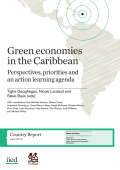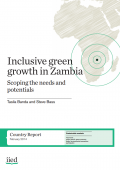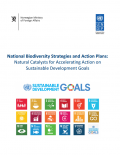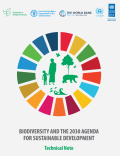
Growing financial, climate and social challenges in the Caribbean have sparked the search for new economic pathways that would better serve the region.
This paper summarises early explorations by the Green Economy Action Learning Group (GE ALG), an independent and Caribbean-driven initiative which aims to help governments and other stakeholders develop a practical Caribbean vision of an inclusive and resilient ‘green’ economy. It pulls together background papers from ALG members, revealing diverse regional, national, local and sector perspectives on green economy progress, needs and prospects.
An ‘action learning’ agenda is proposed as a way to evolve green economy pathways in three areas: SMMEs; ‘triple bottom line’ reporting across public and private sectors; and multi-stakeholder mechanisms for developing green economy policy.

'Inclusive green growth' is no longer just a buzz term. It is shaping donor priorities, influencing national development plans and attracting investment. Yet inclusive green growth policies commonly promoted by international institutions make little, if any, reference to informal economies - which are expanding in all parts of the world in response to changes in our formal economies - and which cater for the world's poor. What does Green Economy mean in the context of informal markets where the world's poorest and most vulnerable people produce and trade? Does 'greening' necessitate formalisation, or can it happen through people's own actions?

Many countries are exploring their prospects for green growth. It has become a hot topic, proving attractive to governments, companies, and civil society groups alike. The 2012 Rio+20 Summit concluded that green growth is best defined and tailored according to the individual country context. This report describes Zambia’s approach to develop a Zambian Inclusive Green Growth Strategy under its Sixth National Development Plan.
The Zambian definition for inclusive green growth, is ‘inclusive development that makes sustainable and equitable use of Zambia’s natural resources within ecological limits’. The report describes the changing international policy and financial context for inclusive green growth, reports on a workshop facilitated by IIED, and proposes initial steps to develop its operational Strategy.

In 2010, the Conference of Parties of the Convention on Biological Diversity (CBD) agreed to an ambitious set of 20 targets, called the Aichi Biodiversity Targets, as part of their commitment to the CBD Strategic Plan. One of the Targets (Target 17) called for each country to revise its National Biodiversity Strategies and Action Plan (NBSAP) in accordance with the Aichi Biodiversity Targets. From 2010 to November 2016, virtually all countries have revised, or are currently completing the revision of, their NBSAP. As of November 2016, 123 countries (76 of them eligible for official development assistance) have submitted post-2010 NBSAPs.

The Strategic Plan for Biodiversity 2011-2020 and its Aichi Biodiversity Targets adopted by the Convention on Biological Diversity has been recognised as setting the global framework for priority actions on biodiversity. The 2030 Agenda is consistent with other existing international commitments, including the Strategic Plan for Biodiversity. The SDGs and the Strategic Plan are mutually supportive and reinforcing, and therefore the implementation of one contributes to the achievement of the other.
